|
"MARX, KARL.
Kapital. Poliitilise Ökonoomia Kriitika [i.e. German ""Das Kapital""]. - [FIRST ESTONIAN TRANSLATION OF MARX'S 'DAS KAPITAL']
Tallinn, Kirjastusühing ""Soprus"", 1936 4to. In contemporary half calf with gilt lettering to spine. Extremities with light wear and corners bumped. Housed in a nice full black cloth clamshell box with black leather title-label to spine with lettering in silver. Otherwise fine and clean. (8), 9-43, (3), 640 pp.
Ссылка продавца : 59261
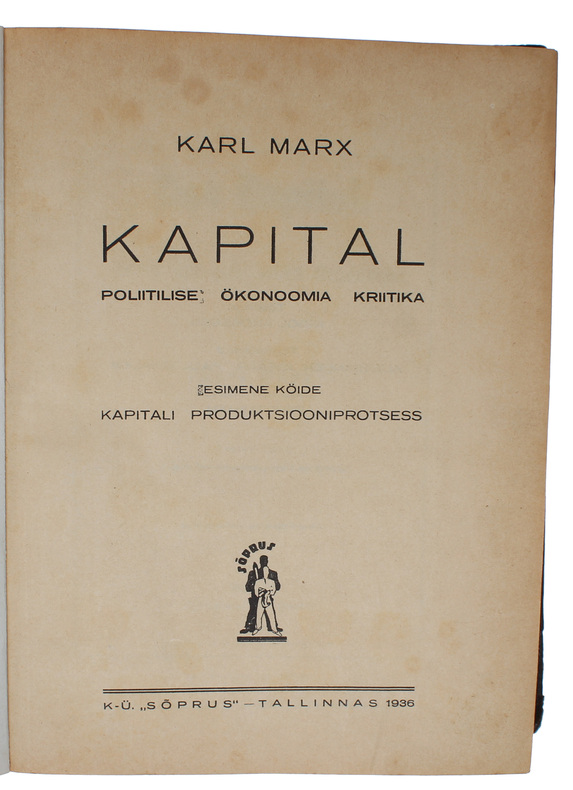
|
|
|
"MARX, KARL.
Kapitalet. Kritik av den politiska ekonomin. I svensk oversättning av Rickard Sandler. 3 vols. - [FIRST SWEDISH EDITION OF MARX' ""CAPITAL""]
Stockholm, Tidens Förlag, 1930-31. 8vo. Three volumes, all in the original publisher's uniform half calf bindings with gilt lettering to spines. Extremities, especially capitals, with a bit of wear. Internally very fine and clean. XXII, (2), 740" XXIII, (1), 479, (1)" XXV,(1), 836, (2) pp.
Ссылка продавца : 59980
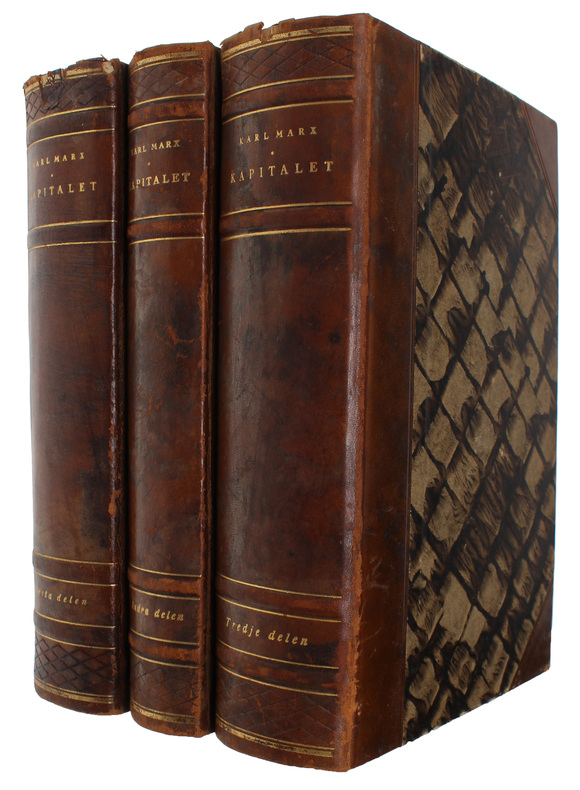
|
|
|
"MARX, KARL.
Kapitalen (i.e. Norwegian: ""Das Kapital""). - [FIRST NORWEGIAN TRANSLATION OF MARX'S 'DAS KAPITAL']
Oslo, Fram Forlag, 1930 - 1931. 5 parts (all). 8vo. 5 part in publisher's original 3 full cloth bindings with title and author in black lettering to front boards and spines. Spines lightly miscoloured, otherwise fine and clean. 166 pp."144 pp. 237 pp.
Ссылка продавца : 60005
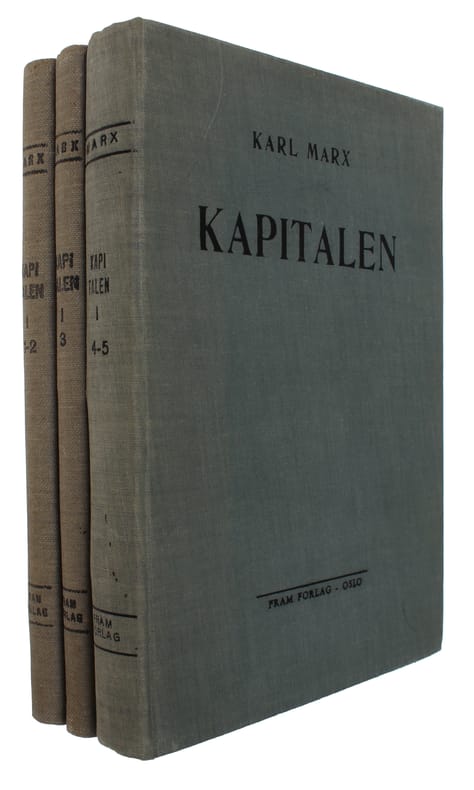
|
|
|
"MARX, KARL.
Kapitaal en Arbeid. Bewerkt door F. Domela Nieuwenhuis. - [THE RARE FIRST DUTCH TRANSLATION]
The Hague, Liebers & Co, (1881). 8vo. Uncut in the original printed wrappers. Spine missing some of the paper and upper part of front wrapper and lower part of back wrappers detached. Wrappers brownspotted and previous owner's name in pencil to upper margin of front wrapper. Pp. 37-40 missing some of the paper in upper margin - far from affecting text, otherwise internally fine and clean. VII, 82 pp.
Ссылка продавца : 60211
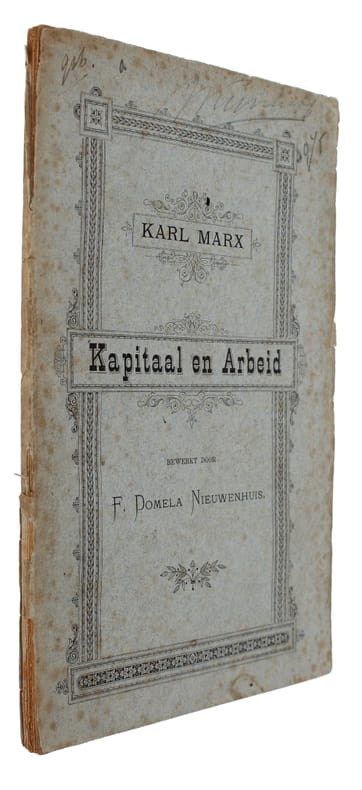
|
|
|
"MARX, KAROL [KARL].
Kapital. Krytyka ekonomii politycznej. Tom Pierwszy. Ksiega I. Wytwarzanie kapitalu. - [FIRST POLISH EDITION OF THE BIBLE OF MARXISM]
[Weimar, Gustaf Uszman] for E.L. Kasprowicz, Lipsk [Leipzig], 1884-[89]. Large 4to. Bound in a very nice recent red half calf with five raised bands and gilt title to spine. Title-page with repair to inner margin and with a few closed tears. Outer margin discreetly reinforced. Verso of title-page with ""1942 D. 1513"" in pencil. Last leaf also with a couple of closed/repaired tears, with minor loss of text, and reinforced in margin. Apart from the nicely restored flaws to the first and last leaf, this is an excellent, very nice and clean copy. VII, 325, (1) pp.
Ссылка продавца : 60267

|
|
|
"MARX, KARL.
Kapital. Kritika politicheskoj ekonomii. Perevod c nmetskago. Tom pervoej. Kniga I. Protschess proizvodstva Kapitala. (Russian, = The Capital. Critique of the Political Economy. Translated from German. Volume One. Book I [all].). - [FIRST TRANSLATION INTO ANY LANGUAGE OF ""THE BIBLE OF MARXISM""]
S.-Peterburg, N.I. Poliakov, 1872. Large 8vo. In a nice recent half calf binding with gilt lettering to spine and five raised bands. First few leaves with light soling and a closed tear and a few marginal repairs to title-page. pp. 11-18 with repairs to upper outer corner. Closed tears to last leaf, otherwise a fine copy. XIII, (3), 678 pp. (wanting the half-title).
Ссылка продавца : 60281
|
|
|
"MARX, KARL (+) FRIEDRICH ENGELS (+) D. B. RIAZANOV (+) HAYIM HOLMSHTOK (+) M. LEVITAN.
Komunistisher Manifest [i.e. ""Communist Manifesto]. - [COMMUNIST MANIFESTO IN YIDDISH]
Moskve [Moscow], Tsentraler Farlag Far Di Felker Fun F. S. S. R., 1924. 16mo. With the original front wrapper (lacking spine and back wrapper). With previous owner's name to front wrapper (Henoch Gelernt). Front wrapper and last leaf with a few nicks, otherwise fine and clean. 181, (3) pp.
Ссылка продавца : 53496
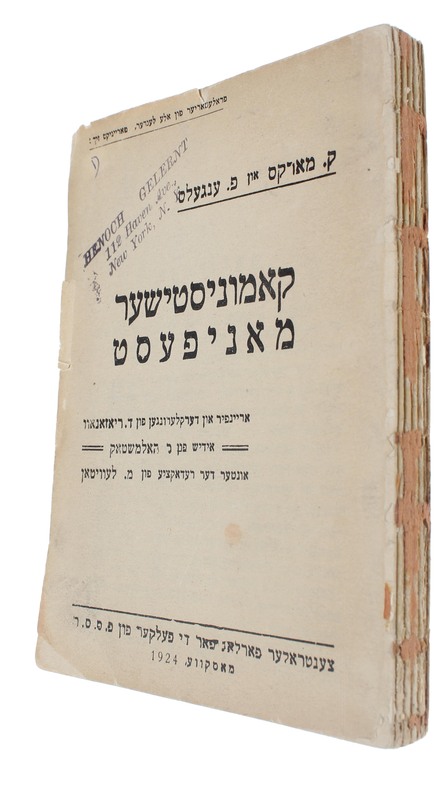
|
|
|
"MARX, KARL (+) FRIEDRICH ENGELS.
Komunisticni manifest. [i.e. ""The Communist Manifesto""]. - [EXCEEDINGLY RARE UNDERGROUND SLOVENIAN TRANSLATION OF THE COMMUNIST MANIFESTO]
[Slovene Littoral, Printed for Agitprop, Presumably 1944]. Small4to. In the original stapled printed grey wrappers. Previous owner's name in light pencil to front wrapper and title-page. A few brown spots to title-page, otherwise a very fine and clean copy. 52 pp.
Ссылка продавца : 54613
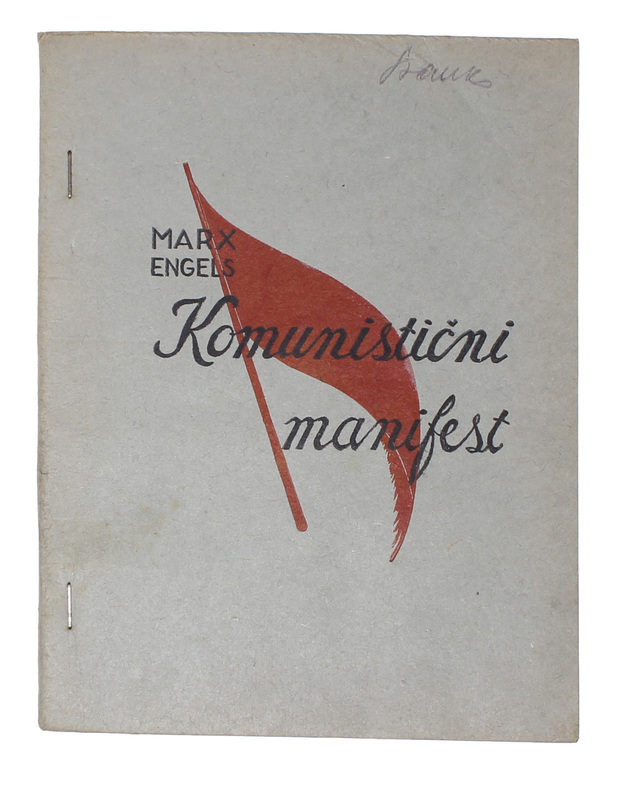
|
|
|
"MARX, KARL (+) FRIEDRICH ENGELS.
Komonistakan Partiayi Manifestë (i.e. Armenian ""The Communist Manifesto""). - [FIRST ARMENIAN TRANSLATION OF THE COMMUNIST MANIFESTO PRINTED IN ARMENIA.]
Yerevan, 1938 8vo. In the original embossed cloth binding with gilt lettering to front board. The profile of Marx and Engels embossed onto front board. Extremities a bit rubbed a underligning in text throughout. 131, (5) pp. + 4 plates (respectively showing Marx, Engels, the title-page of the Original German edition and a letter).
Ссылка продавца : 55317
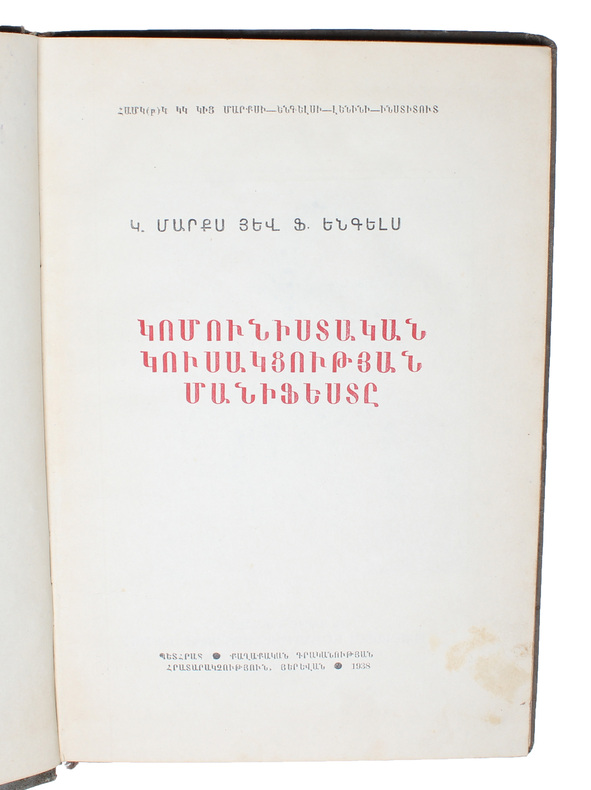
|
|
|
"MARX, K. (+). F. ENGELS.
Komunistički manifest [i.e. Croatian: ""Das Kommunistische Manifest""] - [RARE FIRST CROATIAN TRANSLATION OF THE COMMUNIST MANIFESTO]
Preveo M. Pijade (Belgrad), Biblioteka Marksizma-Lenjinizma, 1945. 8vo (195 x 145 mm). In the original printed wrappers. A few small nicks to wrappers and a few occassional light markings in margin. Otherwise a fine and clean copy. 64, (3) pp.
Ссылка продавца : 59904
|
|
|
"MARX, KARL [Translated by:] P. RUMYANTSEV [Edited by:] A.MANUILOV.
Kritika nekotorykh polozhenii politicheskoi ekonomii. (i.e.: ""Zur Kritik der Politischen Oekonomie"", i.e.: ""A Contribution to the Critique of Political Economy""). - [FIRST RUSSIAN TRANSLATION OF THE BLUEPRINT FOR ""DAS KAPITAL"" ]
Moscow, Izdanie Vladimira Bonch-Bruevicha, 1896. 8vo. In a later modest black half calf binding with marbled boards. Traces of stamp to verso of front and back board. Title-page slightly rubbed. Occassional underlignings in text and margins. Pp. 145-146 reinforced in margin. Otherwise a fine copy. XII, (4), (1)-160 pp.
Ссылка продавца : 59587
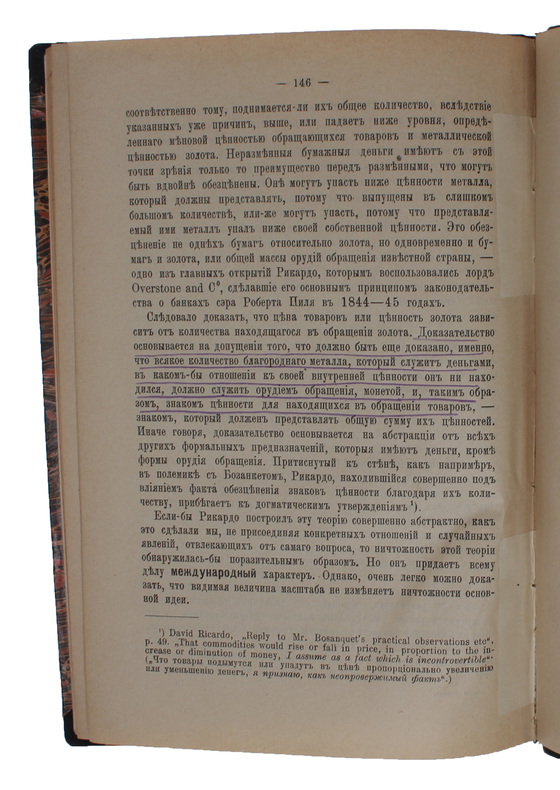
|
|
|
"MARX, KARL.
Marukusu shihonron. [i.e. Japanese ""Das Kapital""]. 5 vols. - [FIRST COMPLETE JAPANESE TRANSLATION OF MARX'S DAS KAPITAL]
Tokyo, Kaizosha, 1927-1928. Small4to. 5 volumes all in publisher's original full red cloth with gilt lettering to spine, all five volumes house the original slipcases. Free end-papers browned and only very light sporadic brownspots throughout. A very fine and clean copy.
Ссылка продавца : 56714
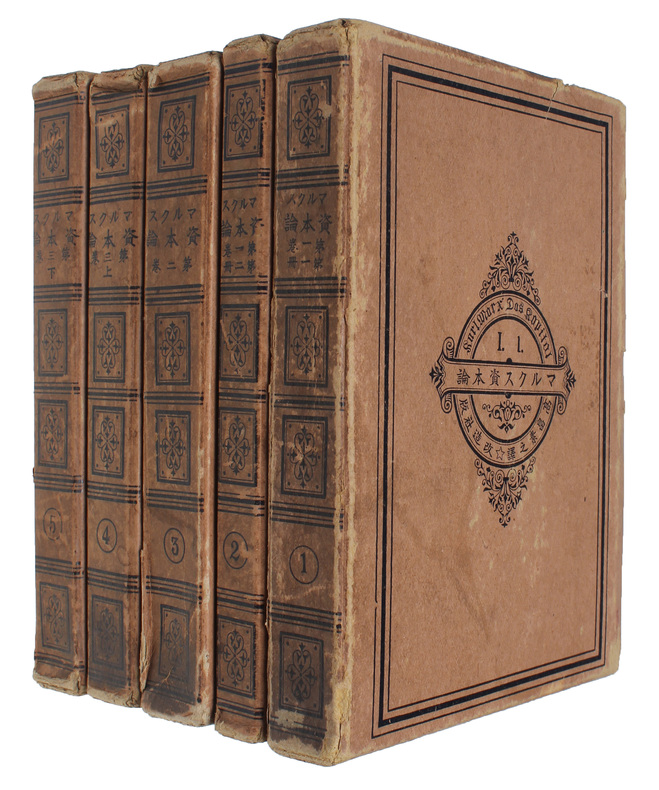
|
|
|
"MARX, KARL.
Pääoma. Kansantaloustieteen arvostelu Ensimäinen nide Ensimäinen kirja: Kapitalistinen tuotanto Alkuperäisen teoksen kuudennesta painoksesta suomentanut O. W. Louhivuori. (i.e. Finnish ""Das Kapital""). - [FIRST FINNISH TRANSLATION OF 'DAS KAPITAL']
Helsinki, Työväen Kirjapaino, 1918. 8vo. In publisher's original red cloth, with gilt lettering. Wear to extremities. Gilting on spine almost gone. Hindges very weak, book block almost detached from binding. Internally fine and clean. (4), XX, 712, (1), 79, (3) pp.
Ссылка продавца : 54737
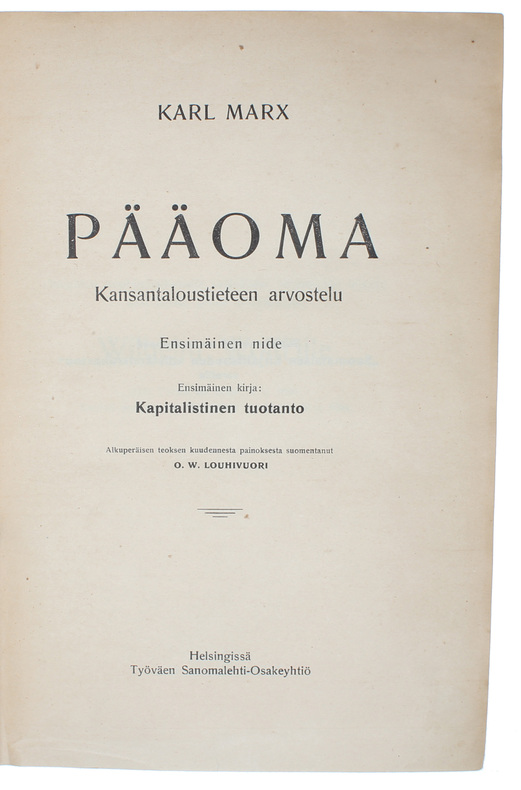
|
|
|
"MARX, KAROL (+) FRIEDRICH ENGELS.
Rewolucja i Kontrrewolucja w Niemczech. (Polish i.e. ""Revolution and Counter-Revolution in Germany""). [Bound with:] Nauki Ekonomiczne (+) Ustroj Socjalistyczny. - [FIRST POLISH TRANSLATION OF MARX'S ""REVOLUTION AND COUNTER-REVOLUTION""]
Warszawa, Bibljoteka Naukowa, 1906. Small4to. Bound in contemporary half calf with gilt lettering to spine with four raised bands. Stamp to title-pages and last leaf, otherwise fine. 277, (3), 154, (6), 51, (1) pp.
Ссылка продавца : 55908
|
|
|
"MARX, KARL (+) HAYDAR RIFAT (translator).
Sermaye. [i.e. Turkish: ""Das Kapital""]. - [FIRST TURKISH EDITION OF THE MOST IMPORTANT ABRIDGED VERSION OF ""THE CAPITAL""]
Istanbul, Sirketi Mürettibye Matbaasi, 1933. 8vo. In a recent full black leather binding with four raised bands and gilt lettering to spine and front board. Blindtooled frames to front and back board. A fine and clean copy. (7), (1), (5)-305, (1), [errata-leaf] pp.
Ссылка продавца : 59547
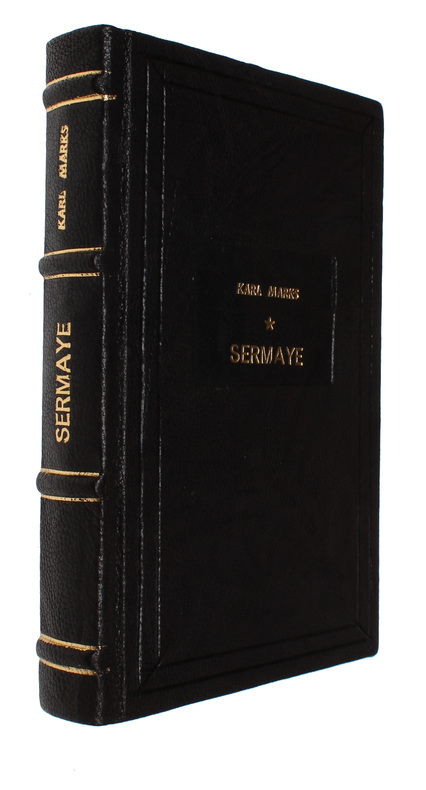
|
|
|
"MARX, KARL (+) HAYDAR RIFAT (translator).
Sermaye. [i.e. Turkish: ""Das Kapital""]. - [FIRST TURKISH EDITION OF THE MOST IMPORTANT ABRIDGED VERSION OF ""THE CAPITAL""]
Istanbul, Sirketi Mürettibye Matbaasi, 1933. 8vo. In contemporary full black cloth binding with gilt lettering to spine. Blindtooled frames to front and back board. Previous owner's name ""Hüsnû Hizlan"" in gilt lettering to front board. A fine and clean copy. (7), (1), (5)-305, (1), [errata-leaf] pp.
Ссылка продавца : 59614
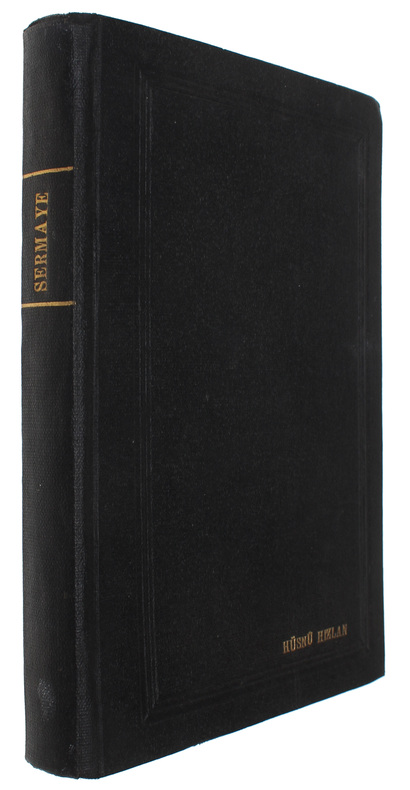
|
|
|
"MARX, KARL.
Walki klasowe we Francji 1848-1850 r. [i.e. English: ""The Class Struggles in France 1848-1850""].
Warszawa, Naklad Wincentego Raabego, 1907. 8vo. Uncut in the original printed wrappers. Wrappers with a few nicks and spine with three small holes. Internally fine and clean. (4), 182 pp.
Ссылка продавца : 55506
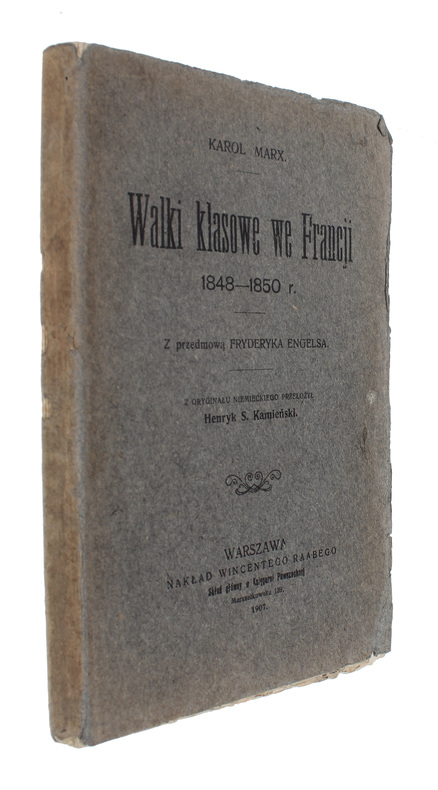
|
|
|
"MARX, KARL.
Zur Kritik der politischen Oekonomie. Erstes Heft [all that appeared]. - [THE BLUEPRINT FOR ""DAS KAPITAL"" - MAGNIFICENT ASSOCIATION-COPY]
Berlin, Franz Duncker, 1859. 8vo. Nice contemporary hafl calf with gilt lettering to spine. A bit of wear to extremities, markings after old label to front board and signs of vague damp staining to front board. A mostly faint damp stain to outer inner corner throrughout, but otherwise very nice. Title-page a bit dusty. Old library number (872) to front free end-paper and top of title-page and marginal pencil-annotations to a number of leaves. VIII, (2), 170 pp. Title-page with the ownership-signature of Alexander Appolonovich Manuilov to top of title-page and binding with his initials ""A. M."" in gold to the fot of spine.
Ссылка продавца : 58578
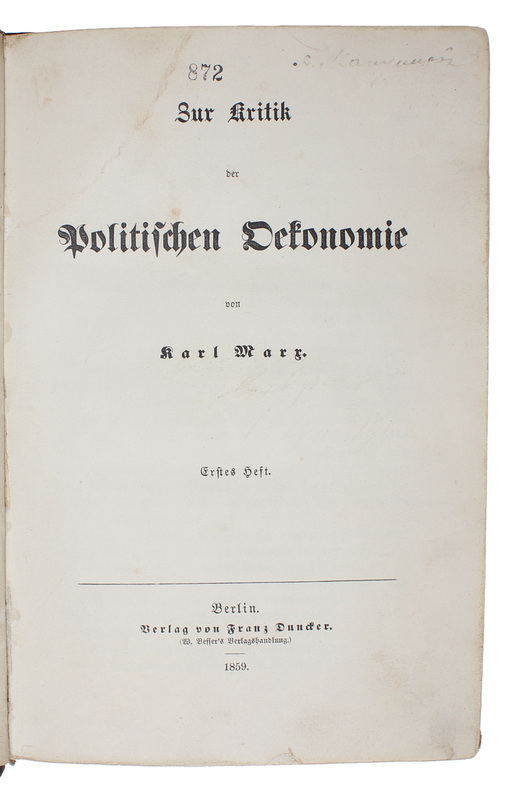
|
|
|
"Marx Arthur"
Red Skelton: An Unauthorized Biography
New York: "E.P. Dutton & Co. Inc." 1979. "First Edition First Printing". Hardcover. Near Fine/Near Fine. "White Cloth and Black Board Covers; edges of white covers are lightly soiled; White Endpapers; book interior is clean and tight; illustrated; 8vo; 326 pages; indexed; dustjacket is protected by a mylar wrapper and because it is white it shows light soiling; top edge of rear panel has a tiny chip and a diagonal corner crease " <br/><br/>1.30#; P3; "E.P. Dutton & Co., Inc." hardcover
Ссылка продавца : 980000167 ISBN : 052518953x 9780525189534

|
|
|
"Marx Joseph L."
Seven Hours To Zero
New York: G. P. Putnam's Sons 1967. "Ex-Library / First Edition First Printing". Hardcover. Very Good/Very Good. "Green cloth covers with title blind-stamped on front cover; pictorial endpapers; book edges lightly soiled and top book edge has a red library stamp; free front endpaper are clean and unmarked; rear endpapers have a library pocket sticker and stamp on free rear endpaper; dustjacket is protected by a mylar wrapper and is attched to book but front attachment is done so as to not hide pictorial image on fixed endpaper; dustjacket is mostly clean with only light soiling to white rear endpaper; book has a bump/scratch at lower reading edges of both front and rear near bottom of covers/dustjacket; spine of dustjacket is lightly sunned and bears an accession sticker; 8vo; 256 pages; Scarce" <br/><br/>1.13#; P3; G. P. Putnam's Sons hardcover
Ссылка продавца : 980001176
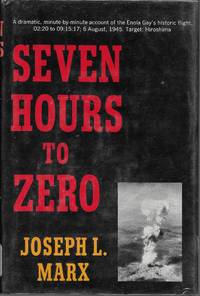
|
|
|
"Marx Karl;Bensaid Daniel""
Contra el expolio de nuestras vidas
2015. Paperback. Very Good-New. Rare book paperback
Ссылка продавца : T7144 ISBN : 8415217994 9788415217992
|
|
|
"Marx Karl;Engels Friedrich""
El manifiesto del Partido Comunista
2007. Paperback. Very Good-New. Rare book paperback
Ссылка продавца : 95667 ISBN : 8495311682 9788495311689

|
|
|
"Marx Karl;Engels Friedrich""
El manifiesto comunista
1997. Paperback. Very Good-New. Rare book paperback
Ссылка продавца : T102117 ISBN : 8482550152 9788482550152
|
|
|
"MARX Karl; JARAMILLO VELEZ Ruben""
Escritos de Juventud sobre el Derecho. Textos 1837-1847
2008. Paperback. Very Good-New. Rare book paperback
Ссылка продавца : T89578 ISBN : 8476588534 9788476588536
|
|
|
"Marx Karl;Engels Friedrich""
La ideología alemana
2014. Paperback. Very Good-New. Rare book paperback
Ссылка продавца : T61419 ISBN : 8446039966 9788446039969

|
|
|
"Marx Karl;Engels Friedrich""
La Sagrada Familia
2013. Paperback. Very Good-New. Rare book paperback
Ссылка продавца : T61271 ISBN : 8446035049 9788446035046
|
|
|
"Marx Karl;Engels Friedrich""
Manifiesto comunista
1992. Paperback. Very Good-New. Rare book paperback
Ссылка продавца : 58853 ISBN : 8477311110 9788477311119
|
|
|
"Marx Samuel and Joyce Vandeveen"
Deadly Illusions: Jean Harlow and the Murder of Paul Bern
New York: Random House 1990. "First Edition First Printing". Hardcover. Fine/Near Fine. Black Cloth and Black Board Covers decorated with gilt lettering; White Endpapers; book interior is clean and tight; illustrated in black-and-white; dustjacket is protected by a mylar wrapper; dustjacket is clean and bright whose only defect is a light bump at upper spine gutter; 8vo; 271 pages <br/><br/>1.39#;P; Random House hardcover
Ссылка продавца : 20071618 ISBN : 0394582187 9780394582184

|
|
|
"RUGE, ARNOLD (edt.) - KARL MARX.
Anekdota zur neuesten deutschen Philosophie und Publicistik von Bruno Bauer, Ludwig Feuerbach, Friedrich Köppen, Karl Nauwerk, Arnold Ruge und einigen Ungenannten. 2 bde. [(Marx): Bemerkungen über die neueste preußische Censurinstruction. Von einem Rh... - [DEFINING THE ESSENCE OF REASON AS FREEDOM - MARX' DEBUT ARTICLE]
Zürich & Winterthur, Literarischen Comptoirs, 1843. 8vo. Bound in one nice later half calf binding in contemporary style with gilt title and blindstamped ornamentation to spine. Faded inscription of ""Eigenthus des Literar. Museum"" to both title-pages and last leaf of bot volumes. Stamps of the same Litarary Museum to volume 1, at both title-page, last leaf and a few leaves inbetween. Neat pencil annotations to a few leaves of volume 1. Neatly washed and with a few tiny closed tears to second gathering. A small spot to lower blank margin of pp. 195-8 of vol. 1. Contents generally clean and crisp. All in all a evry nice copy. IV, 320 + IV, 288 pp. [Marx' paper: Vol. I, pp. 56-88].
Ссылка продавца : 58875
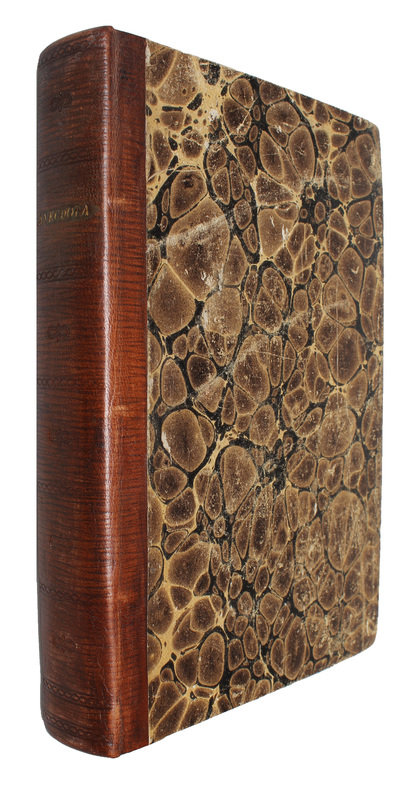
|
|
|
( Editions Champ Libre - Cinéma ) - Groucho Marx - Patrice Ricord dit Ricor.
Correspondance de Groucho Marx .
Editions Champ Libre 1981. In-8 broché oblong de 362 pages au format 21,5 x 12,5 cm. Couverture illustrée à rabats par Patrice Ricord dit Ricor, d'une caricature de Groucho Marx. Dos resté carré avec pâle auréole verticale tout du long. Plats et intérieur frais malgré. Bel état général. Réédition originale, traduite de l’américain par Claude Portail, aidé de Harry Mathews.
Ссылка продавца : 23074
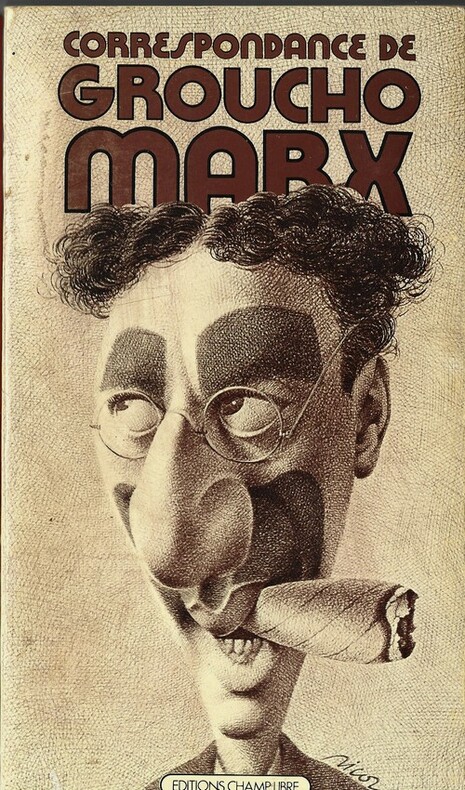
|
|
|
(BORUTTI Silvana) -
Il modo di produzione capitalistico in Marx.
Bologna, Zanichelli, 1980, 8vo (cm. 19 x 11,5) brossura con copertina illustrata a colori, pp. 137 (LF, 2) .

|
|
|
(HALTMEYER, Marx) (1588-1635) (& HUBER, Christian):
Beschreibung der Eidgnössischen Statt St. Gallen. Gelegenheit, Geschichten und Regiment. (Verfasst von Marx Huber). Wie auch des Lebens Hrn. D. von Watt, gewesenen Burgermeisters daselbst (von Christian Huber). 2 Teile in 1 Band.
S. Gallen, Jacob Redinger, M. DC. LXXXIII., (1683), kl. in-8vo, 1 Kupfer-Titel (gest. von Jeremias Renner. Titel: Historische Beschreibung der Statt Sanct Gallen) + 58 Bl., inkl. Titelbl. mit gestoch. herald. Vignette + Blatt 1+2 zu Vadian + 1 mehrfach gefalt. Kupfertafel (Panorama: Die Statt St. Gallen, gest. von H. Pfauw) + 722 S.; gest. Frontispiz-Porträt von ‘Joachimus Vadianus’ (von Watt) + 84 S. (inklus. Titelbl.) + 1 Bl. (Errata), stellenweise leicht gebräunt, hs. Besitzauftrag d. Zeit auf Vorsatz, zeitgen. Pergamentband, etwas gebräunt. Schönes Exemplar
Ссылка продавца : 122628aaf
|
|
|
(Kandel, Efim P. / Preiss, J.J.)
Marx und Engels über das reaktionäre Preussentum. [Hrsg.] Marx-Engels-Lenin-Institut, Moskau.
Moskau, Verlag für fremdsprachige Literatur, 1943. 8° (19,5 x 13 cm). 51 (2) S. Typographisch in Blau gestaltete Original-Broschur.
Ссылка продавца : 98780AB
|
|
|
(MARX Jenny) / FEHRENBACH Jérôme
Jenny Marx. La tentation bourgeoise
Paris, Passés Composés, 2021, 14,5 x 22, 398-VIII pages sous couverture souple illustrée. Avec VIII pages d'illustrations noir & blanc et couleurs.
Ссылка продавца : HISTOALLEMAGN1122
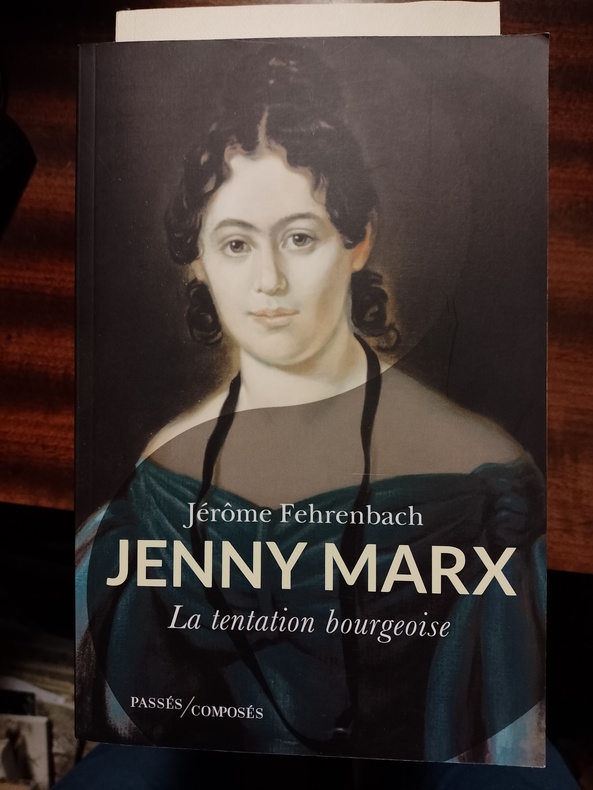
|
|
|
(MARX) SOMERHAUSEN (Luc)
L'humanisme agissant de Karl Marx.
Paris, Richard Masse Editeur, 1946. In-8 broché non coupé, XIV-291 pp. Illustrations en noir. Bel envoi de l'auteur "Pour Jean-Marie Andrieu hommage très affectueux, reconnaissant même pour avoir eu le courage de lire ce livre quand il était envore manuscrit, pour avoir eu la bonne grâce de s'y intéresser";
Ссылка продавца : 8786
|
|
|
(MARX) CALVEZ (Jean-Yves)
La pensée de Karl Marx.
Paris, Seuil, Collection "Esprit", 1957. Fort volume in-8 broché, 664 pp. Critique de la religion et de la philosophie, la dialectique fondements de la science, du réel et de l'éthique, fin de l'aliénation et instauration de l'homme, le marxisme devant la critique.
Ссылка продавца : 5021
|
|
|
(Marx / Engels / Mini-Buch) Duncker, Hermann
Über das Manifest der Kommunistischen Partei.
Verlag Tribüne, Berlin., 1983. 191 S. 16°, OPbd mit OSchuber.
Ссылка продавца : 26860

|
|
|
(Mendjisky) Maurois, A. et al.
LES PEINTURES DE SERGE MENDJISKY, présentées par André Maurois, Marcel Pagnol, Claude-Roger Marx, Raymond Charmet.
Paris, Imprimerie Grou- Radenez 1963, in-4 (24,3 x 28,7 cm) relié toile Les photos noires ont été réalisées par Lucien Petitjean - Marc Vaux, les ektachromes sont dûs à Lucien Petitjean. La photogr avure a été réalisée dans les ateliers de la Sté Offset Poliveaux. Notre exemplaire ne porte pas de numéro.
Ссылка продавца : 10539
|
|
|
(MOUVEMENT OUVRIER) MARX (Karl)
Les luttes de classes en France (1848-1850). Suivi de Les journées de Juin 1848 par Friedrich Engels.
Paris, Editions Sociales Internationales - Bibliothèque Marxiste n° 22, 1936. In-8 broché, 186 pp.
Ссылка продавца : 7487
|
|
|
(REVOLUTION 1848) MARX (Karl)
Les luttes de classes en France (1848-1850). Suivi de Les journées de juin 1848 par F. Engels.
Paris, Editions Sociales, 1946. In-8 broché, 127 pp.
Ссылка продавца : 8232
|
|
|
(SOCIALISME) MARX (Karl) & ENGELS (Friedrich)
Etudes philosophiques. Ludwig Feuerbach, le matérialisme historique, lettres philosophiques, etc. Nouvelle édition revue et complétée d'un index systématique.
Paris, Editions Sociales, 1951. In-8 broché, 173 pp.
Ссылка продавца : 4674
|
|
|
(SOCIALISME) MARX (Karl)
Travail salarié et capital suivi de Salaires, prix et profits.
Paris, Editions Sociales Internationales-Bibliothèque Marxiste N° 14, 1931. In-8 broché, 166 pp.
Ссылка продавца : 4677
|
|
|
-
ARTS ET MÉTIERS GRAPHIQUES NO 44.
Directeur : Charles Peignot. Revue bimestrielle publiée à Paris par Arts et Métiers Graphiques le 15 décembre 1934. In-4 (31 cm) 67, (1) pages, nombreuses illustrations in-texte et 7 encartages hors-texte. Broché. Couverture de Annenikov tirée chez Mourlot Frères. Manque de 2 cm à la tête du dos, petit frottis au dos, intérieur en très bel état. [ Complet de tous les hors-texte; quelques images de Grandville, plan de Suresnes, couverture de « Les Contes du Chat Perché » de Marcel Aymé, paysage de Pierre Boucher, planches extraites de la « Nouvelle clef des songes » et des « Oeuvres de Maupassant » et une page d’annonces des « Encres Lefranc ». Ce numéro contient un article (pp. 49-53) sur « Les Manuscrits de Jacques Cartier » de G. Brito. Aussi, des textes de Max Jacob, Mac Orlan, Michel Leiris, Jean Bruller et Claude-Roger Marx ].
Ссылка продавца : 3763
|
|
|
-
Le seconde lettere di Groucho Marx.
Milano, Adelphi, 1995, 16mo brossura editoriale con copertina illustrata a colori, pp. 58 con illustrazioni (di Beppe Mora) nel testo (supplemento a Cuore, 204) .

|
|
|
.Bastian, Heiner; Dieter Honisch; Erich Marx
Joseph Beuys, Robert Rauschenberg, Cy Twombly, Andy Warhol. Sammlung Marx
, Prestel, 1982 Hardcover with dust jacket, 253 pages : illustrations (some color) ; 30 cm. Very good copy. Text in German. ISBN 9783791305851.
Ссылка продавца : 60981
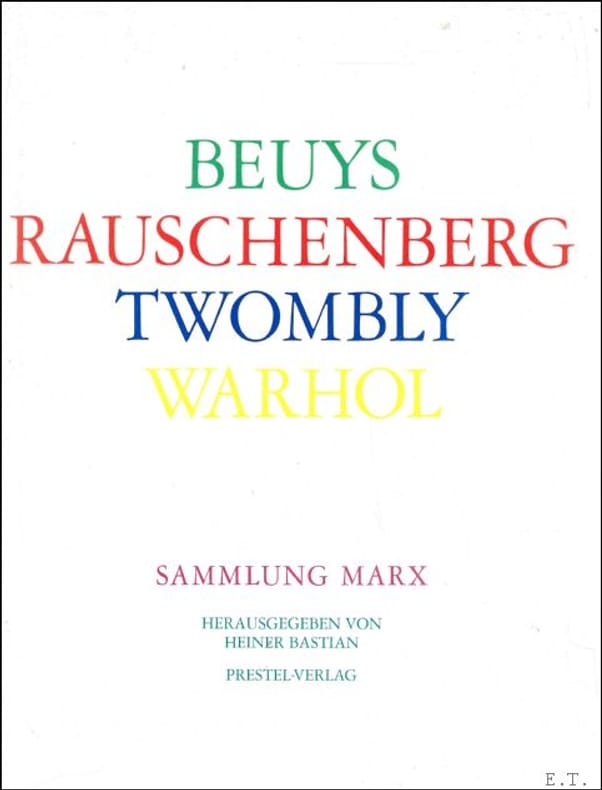
|
|
|
3rd Edition Larsen and Marx
Studyguide for an Introduction to Mathematical Statistics and Its Applications by Marx Larsen & ISBN 9780139223037
Paperback / softback. New. paperback
Ссылка продавца : A9781428814431 ISBN : 1428814434 9781428814431

|
|
|
[ANGLETERRE] - MARX (Roland) -
L'angleterre de 1914 à 1945.
Paris, Armand colin - cursus, 1993; in-8, 175 pp., broché. Broché en état moyen reliure un peu salis texte en bon état.
Ссылка продавца : 201508352
|
|
|
[ANGLETERRE] - MARX (Roland) -
L'angleterre de 1914 à 1945.
Paris, Armand colin - cursus, 1993; in-8, 175 pp., broché.
Ссылка продавца : 200917820
|
|
|
[BEAUX ARTS] - [MARX (Roger)].-
Catalogue des Estampes modernes composant la Collection Roger Marx, dont la vente par suite de décès aura lieu à Paris, Hotel Drouot, Salle n°7, du Lundi 27 avril au samedi 2 mai 1914 inclus. Commissaires-Priseurs : Me F. Lair-Dubreuil et Me Henri Baudoin. Expert : M. Loys Delteil.
P., Imprimerie Ch. Berger, 1914, in 4° broché, 102pp. ; 47 planches hors-texte ; rousseurs ; couverture défraichie et abimée ; exemplaire débroché.
Ссылка продавца : 21406
|
|
|
[Cinéma] – MARX (Harpo).
Harpo Marx par Harpo Marx. (Harpo speaks !).
Editions Charles Mandel, 1963, in-8°, 474 pp, écrit en collaboration avec Rowland Barber, traduit de l'américain par Jean Paradis, broché, couv. illustrée à rabats, bon état
Ссылка продавца : 117343
|
|